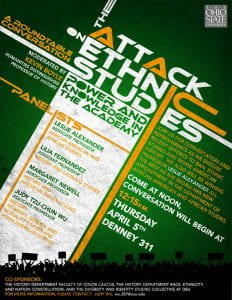The Diversity and Identity Studies Collective at OSU (DISCO) brought together chairs, directors, faculty, staff, and students from the African American and African Studies Department, American Indian Studies Program, Asian American Studies Program, Comparative Studies Department, Disability Studies Program, Latina/o Studies Program, Sexuality Studies Program, and Women’s, Gender and Sexuality Studies Department to consider academic, social, and political issues through cross-disciplinary perspectives. Over the course of its existence (2006-2017), the ever-shifting group experimented with a variety of collaborative practices and took on issues of local, national, and global significance that revolved around social differences, hierarchies, and power. The following is a list of events that were organized collectively by DISCO units and members.
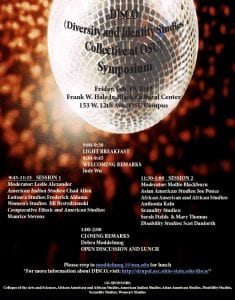 Collaborating Across Social Differences: A DISCO Symposium
Collaborating Across Social Differences: A DISCO Symposium
February 19, 2010, Hale Black Cultural Center. This inaugural DISCO event featured faculty speakers who discussed how their respective fields have developed within and outside of the academy and how collaborations might be formed around issues related to diversity and identity. Co-sponsored by the College of Arts and Sciences. Approximately 150 attendees.
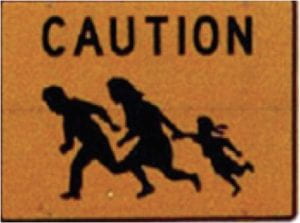 Arizona: Why Should We Care? A Panel Discussion on Immigration and Ethnic Studies
Arizona: Why Should We Care? A Panel Discussion on Immigration and Ethnic Studies
June 3, 2010, Multicultural Center. This event included presentations, videos, and guerrilla theatre about the controversial Arizona immigration bill SB1070, its effect on ethnic studies programs, and the possibility that such legislation would be introduced in other states, including Ohio. Co-sponsored by the Multicultural Center; Office of Minority Affairs; Women’s Studies and Comparative Studies Departments; Kirwan Institute for the Study of Race and Ethnicity; OSU student groups Balancing Education, Life and Latina Awareness (BELLA), Strength, Unity and Respect (SUR), SHADES, Graduate Association of Latinx/Latin American Students, Latino Medical Student Association, Committee for Justice in Palestine; and Reform Immigration for America. Over 200 attendees.
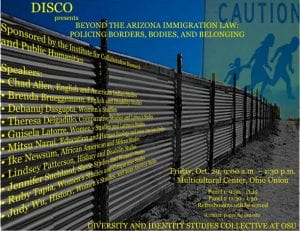 Beyond the Arizona Immigration Law: Policing Bodies, Borders, and Belonging
Beyond the Arizona Immigration Law: Policing Bodies, Borders, and Belonging
October 29, 2010, Multicultural Center. This symposium featured faculty and graduate student speakers who expanded the conversation beyond the particularities of the Arizona immigration bill by exploring how these dynamics have appeared historically across various academic areas and activist arenas. The forum included a particular focus on the ways that the policing of national borders is intimately linked to the policing of desirable and undesirable bodies. Co-sponsored by the Institute for Collaborative Research and Public Humanities. Approximately 120 attendees.
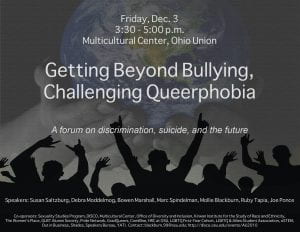 Getting Beyond Bullying, Challenging Queerphobia
Getting Beyond Bullying, Challenging Queerphobia
December 3, 2010, Multicultural Center. At this forum, faculty and staff speakers addressed the increased attention given to queer youth suicides and bullying by considering the ways that these problems and potential solutions have been represented and framed in the national news, other forms of media (including the “It Gets Better” video campaign), and in secondary schools and colleges. Co-sponsored by the Sexuality Studies Program, Multicultural Center, Kirwan Institute for the Study of Race and Ethnicity, Women’s Place, Office of Diversity and Inclusion, GLBT Alumni Society, Pride Network, GradQueers, ComBIne, HRC at OSU, LGBTQ First Year Cohort, LGBTQ & Allies Student Association, oSTEM, Out in Business, SHADES, Speakers Bureau, and Young Adult Transgender Intersex (YATI). Approximately 110 attendees. A version of this forum was also presented at the OSU Lima campus on February 28, 2011.
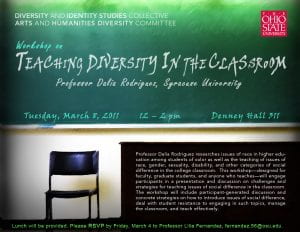 Teaching Diversity in the Classroom
Teaching Diversity in the Classroom
March 8, 2011, 311 Denney Hall. Professor Dalia Rodriguez of Syracuse University led approximately 35 attendees in a 2-hour workshop on challenges and strategies for teaching issues of social difference in the classroom. Organized by the DISCO Graduate Caucus and co-sponsored by the Arts and Humanities Diversity Committee.
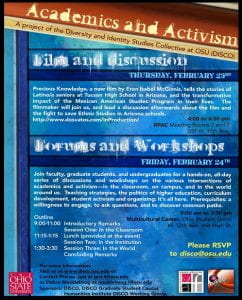 Academics and Activism: Intersections of Curriculum, Academia, Social Engagement and Politics
Academics and Activism: Intersections of Curriculum, Academia, Social Engagement and Politics
February 23-24, 2012, Multicultural Center. This two-day event consisted of a film screening and discussion with producer Eren McGinnis of the documentary Precious Knowledge (2011) about the banning of ethnic studies in Arizona. The following day was comprised of forums and breakout sessions with faculty, graduate students, and undergraduate student activists who examined the intersections of academics and activism in several spheres and at different scales: the classroom, the institution, and the world. Co-sponsored by the DISCO Graduate Caucus, Humanities DISCO Working Group, and Multicultural Center.
Attack on Ethnic Studies
April 5, 2012, 311 Denney Hall. At this event, faculty speakers confronted recent national efforts to ban ethnic studies and revise American history. Tracing the emergence of ethnic studies programs to the activist movements of the 1960s and 70s, the panelists considered such reactionary endeavors as the 2011 ruling in Tucson Unified School District which banned the Mexican American Studies program, and the 2012 proposal by Tea Party activists in Tennessee to remove any references to slavery and to the founding fathers’ owning slaves from Tennessee school textbooks. In addition, the speakers expressed concerns with Ohio Senate Bill 165, which requires that Ohio students center their historical education on the “original texts” of the Declaration of Independence, Northwest Ordinance, and U.S. and state constitutions. Finally, the panelists condemned the recent racist hate crime on the OSU campus and connected their remarks about ethnic studies with the activism that has been mobilized against this act and in support of diversity and inclusion. Co-sponsored by the History Department’s Faculty of Color Caucus, and Race, Ethnicity, and Nation Constellation. Over 75 attendees.
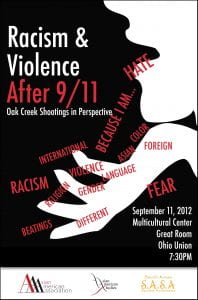 Racism and Violence After 9/11: Oak Creek Shootings in Perspective
Racism and Violence After 9/11: Oak Creek Shootings in Perspective
September 11, 2012, Multicultural Center. Faculty, graduate students, and undergraduate students situated the Sikh Temple shootings in Oak Creek, Wisconsin, in relation to the mosque arson in Joplin, Missouri, and the Martin/Zimmerman case in Sanford, Florida, as well as within the broader contexts of histories of violence against Asian Americans, Muslims, and LGBT people. Speakers also addressed local trends of hate crimes and violent speech, and prejudices toward international students on the OSU campus, centering the discussion around questions of activism and the political and social efficacy of on-campus activities. Co-sponsored by the Asian American Association and Asian American Studies. Over 100 attendees.
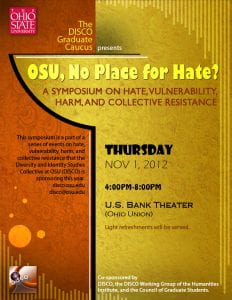 OSU, No Place for Hate? A Symposium on Hate, Vulnerability, Harm, and Collective Resistance
OSU, No Place for Hate? A Symposium on Hate, Vulnerability, Harm, and Collective Resistance
November 1, 2012, U.S. Bank Theater. Undergraduate students, graduate students, faculty, and staff on three panels discussed definitions of hate, hate crimes, hate speech, and hate groups, and the limitations of a strictly legal understanding of hate; the effects of hate, including ways in which people become vulnerable and the kinds of harm they experience in differential ways; and collective activism and turning vulnerabilities into strengths in order to minimize harm and fight hate. Organized by the DISCO Graduate Caucus and co-sponsored by the DISCO Working Group of the Humanities Institute, and the Council of Graduate Students.
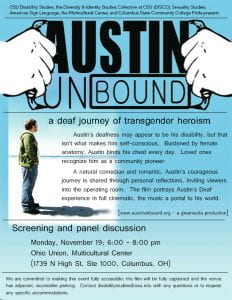 Austin Unbound Screening and Discussion
Austin Unbound Screening and Discussion
November 19, 2012, US Bank Conference Theater. Austin Unbound follows a young, Deaf trans man for six months as he undergoes top surgery so that he can continue his journey of transitioning into his desired gender. After the film, two OSU faculty members and a TransOhio representative situated the film within the genre of documentaries about trans lives, especially when those films deal directly with the intersections of gender with race, class, disability, and other forms of social difference. The ensuing discussion covered a range of topics, from personal connections that audience members made to themes of the film or issues the panelists raised, to questions about the linguistic differences between transitioning as a hearing person vs. as a Deaf person. Co-sponsored by Disability Studies, Sexuality Studies, Multicultural Center, American Sign Language Program, Columbus State Community College Pride group, and Department of Women’s, Gender and Sexuality Studies. Approximately 150 attendees.
 Diversity Talk: Changing the Discourse, Changing Course
Diversity Talk: Changing the Discourse, Changing Course
March 21, 2013, 11th Floor, Thompson Library. The half-day forum featured OSU administrators, faculty, and graduate students as well as Professor Stephanie Fryberg (Psychology and American Indian Studies) of the University of Arizona and Professor Ernesto Martinez (Women’s and Gender Studies) of the University of Oregon. Administrators provided an update on the work of the No Place for Hate Task Force Committees. Professors Fryberg and Martinez examined how current diversity narratives create ambiguity and, in some cases, “explicitly distort the ability to identify and assess the barriers to success experienced by junior faculty of color in the academy.” Speakers in the second half reflected on how their research, teaching, and outreach have been facilitated or impeded by university diversity discourse, practices, and bureaucracy. After the presentations, participants broke out into small groups to continue the discussion before reconvening together to consider steps for moving forward with diversity at OSU. Co-sponsored by the DISCO Working Group of the Humanities Institute, DISCO Graduate Caucus, Multicultural Center, Office of Diversity and Inclusion, Women’s Place, and Kirwan Institute for the Study of Race and Ethnicity. Over 75 attendees.
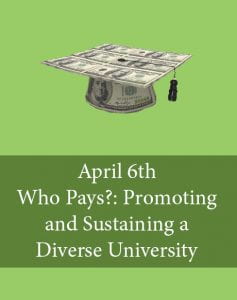 Who Pays? Promoting and Sustaining a Diverse University
Who Pays? Promoting and Sustaining a Diverse University
April 6, 2016, MLK Lounge in Hale Hall. Faculty and staff considered how to create equitable access to the university for a diverse student body and how to foster a culture of belonging for all university members. They addressed the current economic and institutional obstacles to equitable access and how university policies and practices could be changed to promote every student’s access to and success in higher education. As it happened, student-led #ReclaimOSU held an open mic at the same time and occupied the central administration building as a means to make their voices heard regarding the university’s financial investments in various corporate and military entities. DISCO encouraged concerned community members to support the student efforts; thus, attendance at the DISCO event was limited.
